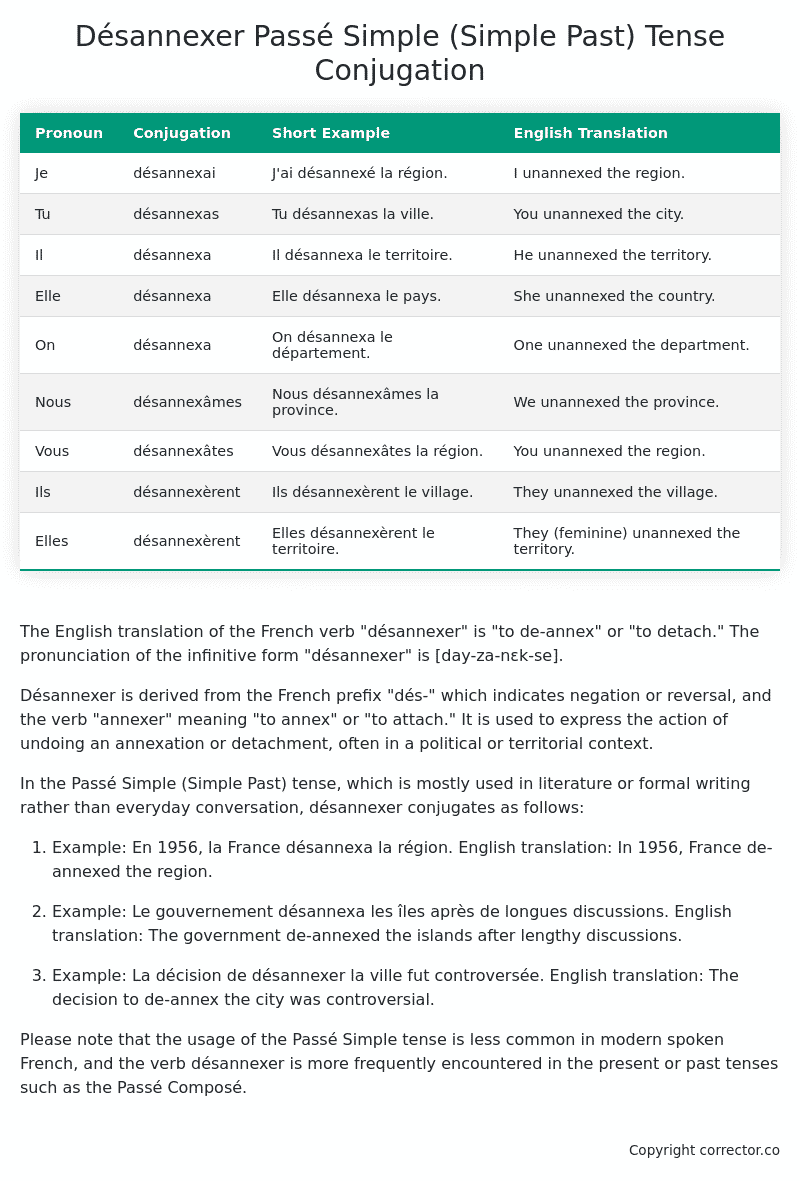Passé Simple (Simple Past) Tense Conjugation of the French Verb désannexer
Introduction to the verb désannexer
The English translation of the French verb “désannexer” is “to de-annex” or “to detach.” The pronunciation of the infinitive form “désannexer” is [day-za-nɛk-se].
Désannexer is derived from the French prefix “dés-” which indicates negation or reversal, and the verb “annexer” meaning “to annex” or “to attach.” It is used to express the action of undoing an annexation or detachment, often in a political or territorial context.
In the Passé Simple (Simple Past) tense, which is mostly used in literature or formal writing rather than everyday conversation, désannexer conjugates as follows:
-
Example: En 1956, la France désannexa la région.
English translation: In 1956, France de-annexed the region. -
Example: Le gouvernement désannexa les îles après de longues discussions.
English translation: The government de-annexed the islands after lengthy discussions. -
Example: La décision de désannexer la ville fut controversée.
English translation: The decision to de-annex the city was controversial.
Please note that the usage of the Passé Simple tense is less common in modern spoken French, and the verb désannexer is more frequently encountered in the present or past tenses such as the Passé Composé.
Table of the Passé Simple (Simple Past) Tense Conjugation of désannexer
| Pronoun | Conjugation | Short Example | English Translation |
|---|---|---|---|
| Je | désannexai | J’ai désannexé la région. | I unannexed the region. |
| Tu | désannexas | Tu désannexas la ville. | You unannexed the city. |
| Il | désannexa | Il désannexa le territoire. | He unannexed the territory. |
| Elle | désannexa | Elle désannexa le pays. | She unannexed the country. |
| On | désannexa | On désannexa le département. | One unannexed the department. |
| Nous | désannexâmes | Nous désannexâmes la province. | We unannexed the province. |
| Vous | désannexâtes | Vous désannexâtes la région. | You unannexed the region. |
| Ils | désannexèrent | Ils désannexèrent le village. | They unannexed the village. |
| Elles | désannexèrent | Elles désannexèrent le territoire. | They (feminine) unannexed the territory. |
Other Conjugations for Désannexer.
Le Present (Present Tense) Conjugation of the French Verb désannexer
Imparfait (Imperfect) Tense Conjugation of the French Verb désannexer
Passé Simple (Simple Past) Tense Conjugation of the French Verb désannexer (You’re reading it right now!)
Passé Composé (Present Perfect) Tense Conjugation of the French Verb désannexer
Futur Simple (Simple Future) Tense Conjugation of the French Verb désannexer
Futur Proche (Near Future) Tense Conjugation of the French Verb désannexer
Plus-que-parfait (Pluperfect) Tense Conjugation of the French Verb désannexer
Passé Antérieur (Past Anterior) Tense Conjugation of the French Verb désannexer
Futur Antérieur (Future Anterior) Tense Conjugation of the French Verb désannexer
Subjonctif Présent (Subjunctive Present) Tense Conjugation of the French Verb désannexer
Subjonctif Passé (Subjunctive Past) Tense Conjugation of the French Verb désannexer
Subjonctif Imparfait (Subjunctive Imperfect) Tense Conjugation of the French Verb désannexer
Subjonctif Plus-que-parfait (Subjunctive Pluperfect) Tense Conjugation of the French Verb désannexer
Conditionnel Présent (Conditional Present) Tense Conjugation of the French Verb désannexer
Conditionnel Passé (Conditional Past) Tense Conjugation of the French Verb désannexer
Conditionnel Passé II (Conditional Past II) Tense Conjugation of the French Verb désannexer
L’impératif Présent (Imperative Present) Tense Conjugation of the French Verb désannexer
L’impératif Passé (Imperative Past) Tense Conjugation of the French Verb désannexer
L’infinitif Présent (Infinitive Present) Tense Conjugation of the French Verb désannexer
L’infinitif Passé (Infinitive Past) Tense Conjugation of the French Verb désannexer
Le Participe Présent (Present Participle) Tense Conjugation of the French Verb désannexer
Le Participe Passé (Past Participle) Tense Conjugation of the French Verb désannexer
Struggling with French verbs or the language in general? Why not use our free French Grammar Checker – no registration required!
Get a FREE Download Study Sheet of this Conjugation 🔥
Simply right click the image below, click “save image” and get your free reference for the désannexer Passé Simple tense conjugation!

Désannexer – About the French Passé Simple (Simple Past) Tense
Formation
Usage
Narration
Historical Context
Interactions with other tenses
Passé Composé
Imparfait
Conditional and Subjunctive
Summary
I hope you enjoyed this article on the verb désannexer. Still in a learning mood? Check out another TOTALLY random French verb conjugation!


